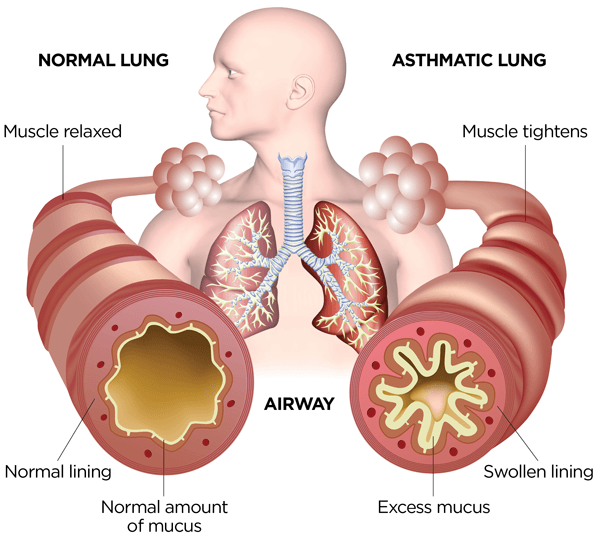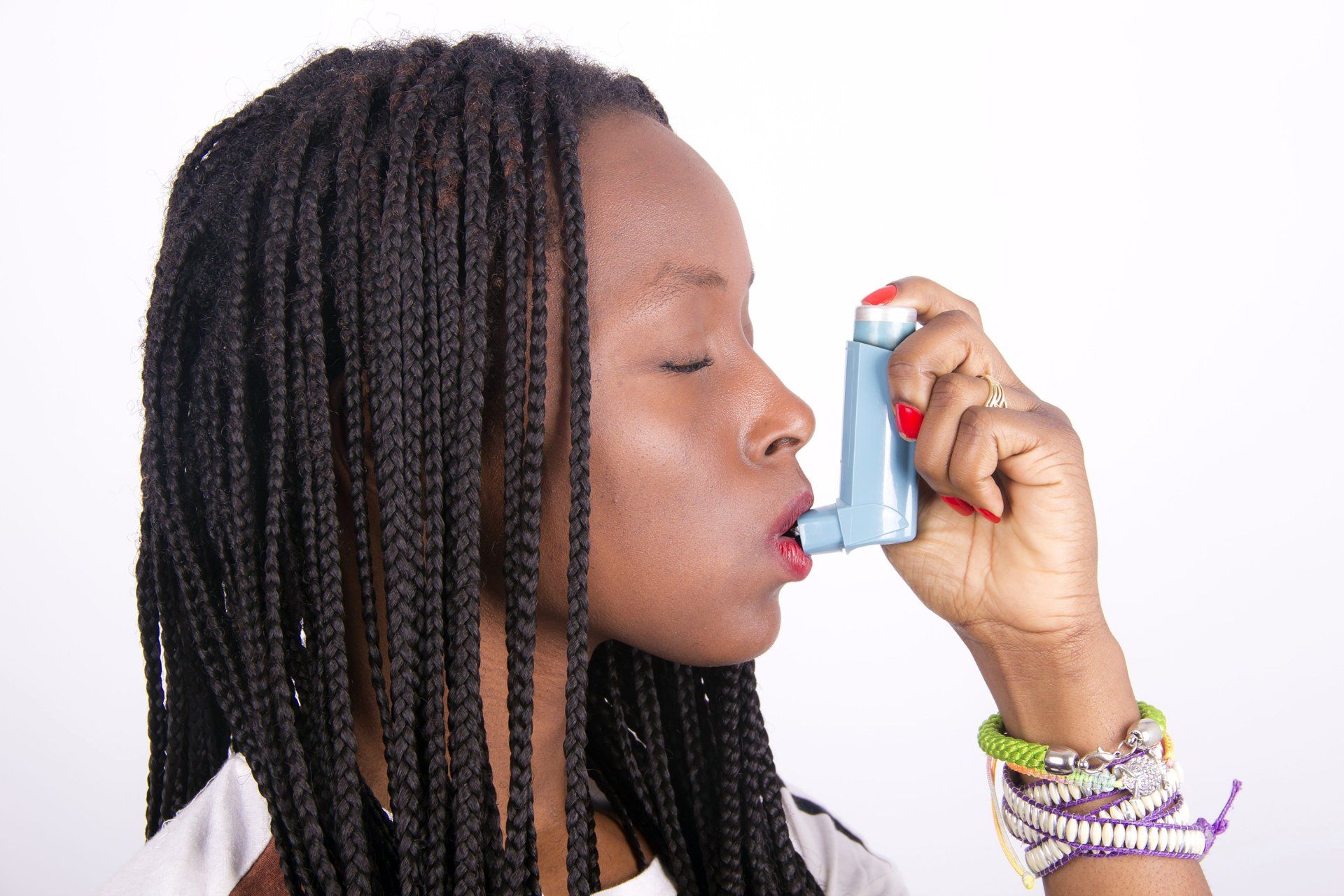What is Asthma?
This article will provide a comprehensive overview of asthma to help you understand what it is, and how it is diagnosed.

Source: American Thoracic Society
Authors: Marianna Sockrider MD, DrPH, Lynn Fussner MD
Reviewers: Maureen George, PhD RN AE-C FAAN, Beverley Sheares, MD, MA
What is Asthma?
Asthma is a chronic disease that affects the airways of your lungs. Your airways are the breathing tubes that carry air in and out of your lungs. There are two main problems in asthma: swelling and increased mucus (inflammation) in the airways, and squeezing of the muscles around the airways (bronchospasm). These problems can make it hard to breathe. Taking medicines and avoiding things that trigger asthma can help control asthma. This fact sheet will address the basics of asthma—what it is, how it is diagnosed, and what are some common triggers.

How do I know if I have Asthma?
Common symptoms of asthma include:
- Cough—often dry and can have harsh bursts
- Wheezing—a whistling sound mainly when you breathe out through narrowed airways
- Chest tightness
- Shortness of breath which may occur with activity or even at rest
When you are having a problem with asthma, you may feel like you are breathing through a straw because it is hard to move air through your narrowed airways. Cough is often a first symptom of an asthma problem. Cough most often occurs at night or early in the morning.
While asthma is a chronic disease, you may not have symptoms every day. You may have days with cough, wheeze and/or shortness of breath and other days when you feel completely fine. If you have symptoms often and/ or they are interfering with your activities, you should talk to your healthcare provider.
An “asthma attack” means rapid and severe worsening of your asthma. If you think you are having an asthma attack, follow the emergency (red zone) Action Plan that you developed with your healthcare provider. If you are not getting better, or getting worse, you should immediately seek emergency care.
Diagnosing Asthma
Asthma is usually suspected by a healthcare provider based on a pattern of symptoms and response to medicine called a bronchodilator that can relief the squeezing of the muscles around the airways. In people over 5 years of age, a breathing test called spirometry (a type of pulmonary function test–PFT) helps confirm the diagnosis. This test can detect narrowing (obstruction) in the airways. A normal breathing test result does not mean you do not have asthma. Your healthcare provider may recommend other types of testing to look for asthma.
If you have been diagnosed with asthma, but it is not getting better with treatment, you might benefit from seeing an asthma specialist. Sometimes asthma can be difficult to control. At times, other medical problems can make asthma worse or harder to control. Based on your symptoms, your healthcare provider may suggest testing for other problems, such as allergies, sinus disease, vocal cord dysfunction (VCD), inspiratory laryngeal obstruction (ILO), gastric reflux (heartburn), or heart problems.
Work with your healthcare provider to get the tests and treatment you need to be sure you have good asthma control which can improve your quality of life.

What triggers Asthma symptoms?
If you have asthma, your airways are more sensitive than normal. Your airways can get irritated easily when exposed to a variety of things, called “triggers.” Exposure to triggers can lead to both muscle spasm and inflammation/swelling described above. Sometimes asthma symptoms occur right away after you are exposed. Sometimes your symptoms may occur hours later. You have to be a detective and think about what may be around you that can trigger your asthma. Knowing and avoiding your triggers can help with asthma control. There may be some triggers that you cannot avoid or control and may need treatment to keep them from causing asthma symptoms. Some common triggers of asthma include allergies, respiratory infections, stress, exercise, and medications.
Allergies
Allergies are reactions of your immune system as it responds to things in the environment (allergens) that often do not cause most people harm. Having allergies can run in families (be inherited).
You may have any or all of these reactions with exposure to allergens:
- skin rashes (eczema or hives)
- nose and sinus problems (rhinitis)
- eye irritation (conjunctivitis)
- asthma symptoms
- severe reaction (anaphylaxis)
Symptoms of nasal allergies include sneezing, itching, runny nose, postnasal drip into the back of your throat, or nasal congestion. If you have nasal allergy problems that are not well controlled, this can also worsen asthma control. If you have allergies, you may be more likely to have asthma.
Common allergens include:
- Pollen from weeds, trees, grasses
- Molds
- Cat or dog
- Dust mites and cockroaches
Irritants
Irritants are things that can irritate the airways and cause asthma symptoms. These are different from allergies.
Examples of airway irritants include:
- Dust particles
- Weather changes
- Outdoor air pollution including ozone, smog, and exhaust fumes
- Chemicals, such as pest control sprays or indoor cleaning products
- Odors from paint, hair spray, perfume or cologne
- Smoke or vapors from cigarettes, cigars, electronic cigarettes, marijuana, hookahs, and pipes
Respiratory Infections
Lung or sinus infections are the leading cause of asthma related hospitalizations. They are also the most common reason people with asthma miss school and work. Infections can trigger longer episodes of wheezing and shortness of breath. If you get a respiratory infection, follow your action plan and seek medical care if your asthma symptoms are getting worse.
Other Common Triggers
It is important to recognize when these are present, and note how they may affect you:
- Stress—Talk to your healthcare provider about things that cause you stress and learn stress relieving techniques
- Exercise—talk to your healthcare provider about how to exercise safely with asthma
- Medications, including aspirin and beta-blockers (medicines often used for the heart or blood pressure)
- Sulfites (a type of preservative) in foods/drinks, such as dried fruits, wine, and beer









